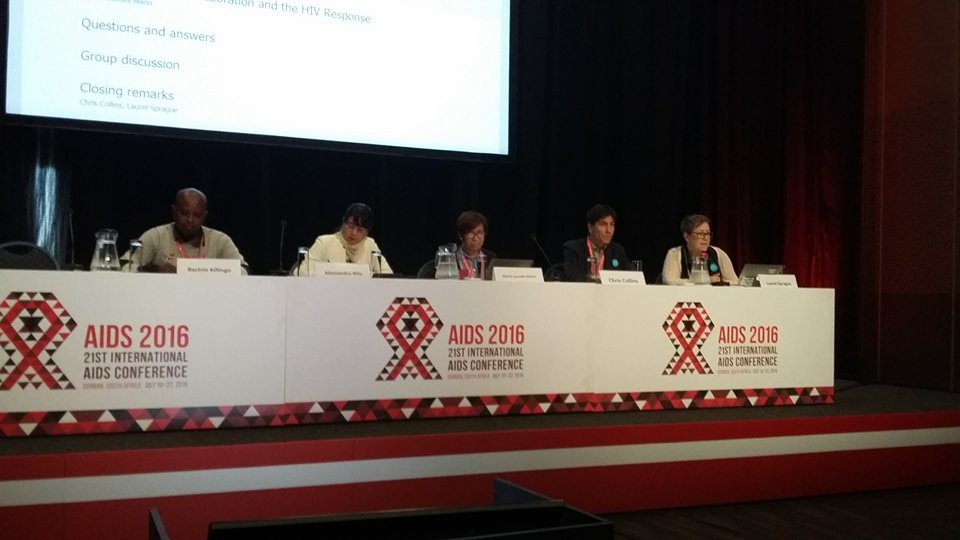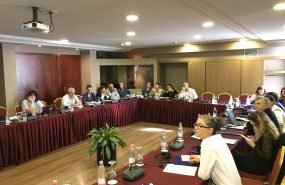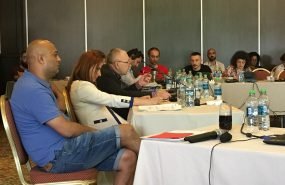AIDS2016: Role of civil society, advocacy and transition
- 05.08.2016 11:53
- Post Views: 1,429
On one hand, community connected to overcoming HIV achieved great success. On this conference you can hear key words which were not possible before: role of key groups, human rights, communities’ development, gender equality. Simultaneously, a difficult period starts for civil society, and this affects not only movement for overcoming HIV. Influence of conservative powers is being strengthened everywhere. Democracy and human rights is a very fragile achievement which can not be taken as granted. HIV response also faces funding cutbacks in terms of global solidarity. Global Fund funding model is based on countries voluntary contributions. Situation inside these countries is the following – governments makes decision to leave money inside the country, indicating the need of funding other priorities. Countries, which Global Fund left, face “organizations mortality”. When civil society organizations disappear there is no one to protect interests of groups they represent.
In connection to this, lion’s share of discussions goes around what civil society organizations should do. Session focused on transition revealed different ideas: to continue demand Global Fund funding “Global Fund should find new model of funding”, to understand that government money is people’s money, not money of ministers and presidents, however, revolution offers did not contain any specific ideas, how exactly communities’ representatives will distribute this money, especially in the context of non-democratic countries. A lot of words were said about unfair current policy of funding cutbacks and skepticism was expressed about reports on end of HIV era and victory over infection in global scale.
The most interesting things were told by civil society representatives from countries which fund has already left. Grigoriy Vergus (ITPC.ru) from Russian Federation told that organizations stopped existing but those which are left are real civil society organizations which continue working and find grant money for their work. (Session: How to Avoid Jumping from the Kettle into the Fire: What You can do When Your Country Becomes «Middle Income»)
Government funding of organization is also in agenda, but in this case the thing is in loss of independence.
One more issue that was raised in discussions is broadening of activities range. HIV prevention and treatment becomes a component of more complex work on communities strengthening. Interesting poster presentation: Indian project Population Council и India HIV/AIDS Alliance for the cost of Melinda and Bill Gates foundation worked on social and financial integration of MSM and sex workers. Their indicators are opening of bank account, receiving vote card, ration card, and HIV prevention and treatment is only one component of activity on social integration of marginalized community.

Broadening range of activities is really important for advocacy as well. Alessandro Nylo from Gestos, on the advocacy session: Advocacy Tactics I: High Level Meetings, Sustainable Development Goals, and Grassroots Activism told how they managed to build common platform with other movements – labour unions dealing with environment protection, fighting disease etc., and get involved into common agenda of civil society.

There was a lot of criticism about representation of key groups on international scene, for example, on HLM on AIDS in UN (New York, June 2016). It often occurs that representatives do not represent anyone, but just pretend to do so. However, there were no specific decisions how to change it.
There is no universal answer on the question what organizations should do in the context of transition. But if people are eager for what they od and they are active about it, they will find the way. It is necessary to build capacity to be persuasive in advocacy, to unite, no matter how difficult it is, to leave the closed world of HI response and look for opportunities.
Professionalization of the sphere will end but activism will stay. To make this activism effective, we need capacity and knowledge about how to communicate on international level, with local authorities and pharma. Communities have to be organized and have specific formulated and evidence-based requirements, clear and realistic for implementation. They also should be backed up by the fact that they come from big number of people represented by certain activist.
Related News
New opportunity to develop innovative harm reduction lead by community – the ViiV Healthcare Positive Action HIV Challenge
Positive Action Challenges seek to find innovative solutions to a particular issue or challenge. The ViiV Healthcare Positive Action HIV Challenge has been announced, in partnership with IAS and INPUD. The call for proposals will open on 16 March 2020 at 00h01 GMT and close on 17 April at 23h59 BST. Post Views: 1,339 Read moreWorkshop: Transition from Global Fund support of HIV and TB programs to national funding: role, opportunities and priorities for civil society in Albania
The workshop “Transition from Global Fund support of HIV and TB programs to national funding: role, opportunities and priorities for civil society in Albania” took place in Tirana, the capital city of Albania, on 23 – 24 of October and gathered 29 participants including civil society representatives, CCM members, representatives of the Global Fund CRG […] Read moreTransition of TB program in Romania: the role, opportunities and priorities for civil society
35 participants including civil society representatives, CCM members, Global Fund Portfolio Manager, experts from neighboring countries and representatives of the governmental structures gathered in Bucharest on 13 – 14 of June at a workshop to discuss what they can do for a greater sustainability of the country’s responses to the TB and HIV epidemics. Post […] Read moreServices for migrants and refugees from Ukraine – HIV/TB care with a focus on key populations
Due to the increasing flows of refugees from Ukraine because of Russia’s invasion of Ukraine, the EECA Regional Platform created a spreadsheet to fill contacts details of face-to-face and online services for refugees and migrants (with a focus on HIV/TB care and key population groups).
Regional Platform – EECA
This web-resource is a part of new regional communication and coordination project “Regional Civil Society and Community Support, Coordination and Communication Platform - EECA”, implemented by Eurasian Harm Reduction Association (EHRA).
Tags
See also
-
EECA’s Regional Platform monthly Newsletter #20, January 2026 27.01.2026 12:58
-
Global Fund Eligibility List 2026 27.01.2026 11:19







